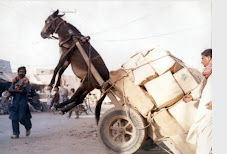
Jomba residents routed from their homes by fighting have taken refuge in a school 15 miles away in Rutshuru since mid-October. (Lynsey Addario for The New York Times)
GOMA, Congo Dec. 16th — Frustration at the United Nations peacekeeping force and the dozens of aid organizations working in North Kivu Province, in eastern Congo, is rising as violence increases, the number of displaced people here creeps toward one million and the pace of assistance lags, especially to those fleeing the fighting in the past few weeks. Many Congolese want the United Nations peacekeepers to intervene more forcefully and fight beside the Congolese Army against the rebel forces of Laurent Nkunda, a renegade general who refuses to merge his troops into the national armed forces. The fight against General Nkunda has pushed Congo to the brink of a new civil war, a year after the first elected government in four decades took office and four years after fighting officially ended. Congo’s army has proved unable to beat back the rebels, and the fighting in the past year has displaced 425,000 people. The United Nations force has a strong mandate in Congo to use force to protect civilians, and it has pledged to defend Goma and the camps around it from being overrun by rebels. It is also required to work with the Congolese Army to establish security, which has led to the expectation in a population weary from more than a decade of conflict that the United Nations force here, known by its acronym, Monuc, would help defeat the rebels. “Why is Monuc here, if not to fight these people who make us suffer?” said Mwenge Biroto, who fled the town of Sake on Tuesday. “Why don’t they help us get peace?”
Diplomats from several Western countries have also questioned why Monuc has not acted more forcefully to prevent civilians from having to flee in the first place, an issue that is likely to come up as diplomats gather here this weekend to discuss regional security. The force’s mandate is up for renewal in the Security Council this month. United Nations officials say that their role is to help Congo’s government, not take its place, and that protecting civilians is mainly the government’s responsibility. The United Nations has provided transportation for troop movements and some helicopter air support to the government’s unsuccessful efforts to remove General Nkunda. Congolese frustration with the United Nations force is more than matched by anger at its own military, which retreated in the face of rebel attacks last week. Brig. Gen. Indrajeet Narayan, the commander of the 4,500 peacekeeping troops deployed in North Kivu, said the force was not authorized to go any further unless it was under attack. “There is a lot of expectation” from civilians, General Narayan said. “They see our troops, they see our weaponry, so they expect this should be used. However the mandate clearly states that we have to protect the civilian population, that is foremost.”
The United Nations also has serious human rights concerns in working too closely with the Congolese military, which has struggled, largely unsuccessfully, to maintain discipline and morale. The army is mostly composed of former members of the old national army and militias who fought in the civil war. They have been retrained and redeployed, but problems have continued, and the army has been accused of many human rights violations, including murder and rape. Human rights organizations and aid workers say that the army sometimes collaborates with militias, like the Mai Mai. Last week, the 14th Brigade, which the rebels chased out of Mushake, harassed civilians and looted as it left, drawing censure from the United Nations. Many Congolese are also frustrated with aid organizations, many of which began to scale back emergency programs after last year’s election to focus more on long- and medium-term development, the brick-and-mortar projects, like schools, clinics and water systems, needed to rebuild a shattered country. They are struggling to keep up with the surge in demand for basic supplies, like food and shelter for the endless river of displaced people, and work amid the violence.
Hunger and disease, not bullets and bombs, have always been the primary killers in Congo, where some researchers estimate four million have died since the war began in 1996. People on the run often crowd in with relatives in provincial towns to avoid the refugee camps. But this practice can make them more vulnerable to disease — most camps have clean water and latrines. In Rutshuru, a large regional town, a cholera epidemic brings 50 people daily to a hospital run by Doctors without Borders. Cholera is a grim byproduct of displacement. When rural people flock to cities, they take cholera with them. In crowded and unsanitary conditions, it spreads like wildfire, said Augustin Augier, the hospital’s coordinator. “The violence and disease are completely connected,” Mr. Augier said. “We have never seen a cholera epidemic in Rutshuru; it is only as a result of the crisis.” The hospital set up a cholera ward, and a workshop to build cots. Speed is essential. Caught early, cholera is treatable — no medicine is needed, just copious infusions of intravenous fluids. But left untreated, it kills half of its victims, sometimes in a day.
Getting food to the displaced has been a problem. Security concerns and rutted, mud-choked roads have made it difficult to move supplies. “The vast majority of North Kivu’s people are farmers, so when they get displaced, food becomes an issue almost immediately,” said Aya Shneerson of the World Food Program. “A lot of times they really run with nothing.” Many are displaced multiple times, running from one village to another as the fighting moves, Ms. Shneerson said. Even when populations can return, they cannot farm because of roaming armed groups. Rebels and army soldiers alike, aid and human rights workers say, rape women who leave their villages to farm. Child malnutrition is rising, and displaced people are forced to flee with no food, leaving them dependent on handouts. In Minova, a town where dozens of ragged, exhausted families arrived last week seeking refuge, Cadre, a local aid organization, opened a spare building where it usually offers sewing classes as a shelter from the driving rain. “We really don’t have anything to offer them — no food, nothing to make shelter,” said Edouard Dunia, who leads Cadre. Eugenie Hasima sat on a hill nearby, trying to calm her daughter Ajira, 2, who screeched for food. “I have nothing to give her,” she said, breaking down in sobs as Ajira cried inconsolably. “She has not eaten since yesterday, and she spent all day walking. We are all just so hungry.”
By LYDIA POLGREEN
+++++++++++++++++++++++++++++++++++++++++++++++++++
Disclaimer
No responsibility or liability shall attach itself to either myself or to the blogspot ‘Mozlink’ for any or all of the articles/images placed here. The placing of an article does not necessarily imply that I agree or accept the contents of the article as being necessarily factual in theology, dogma or otherwise.
Mozlink




















































































